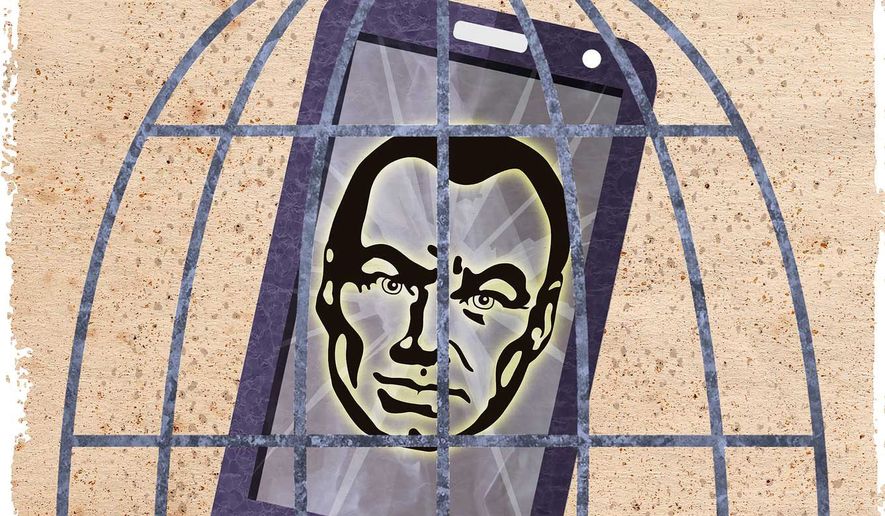OPINION:
America’s love-hate relationship with Big Tech was illustrated pretty unmistakably in this year’s “The Mitchells vs. The Machines,” a family comedy where the title family squares off against an army of maniacal robots (created by a hood-wearing Silicon Valley baron named Mark). The film depicts social media as unambiguously damaging to interpersonal relationships while yearning for a world of VHS home movies, pre-GPS road trips, and so on.
But the film debuted on Netflix rather than a wide theatrical release. And they want everyone to be sure to follow it on Instagram and give it a 10 rating on IMDB. Message: we resent the downsides of the modern Internet, but we’re not going to sacrifice its luxuries.
While that kind of contradiction is fine for a family comedy, it doesn’t make a good philosophy for legislation. The wealth and wonder created by the last 20 years of innovation have improved more people’s quality of life than at any other time in human history. Still, there do need to be appropriate public guardrails to make sure this technology continues to help rather than harm.
That is not – surprise, surprise – the solution the Democrats have.
Rep. David Cicilline (RI) and Sen. Amy Klobuchar (Minn.) have introduced companion pieces of legislation – the creatively titled American Choice and Innovation Online Act and American Innovation and Choice Online Act – which aims to create “commonsense rules of the road for major digital platforms to ensure they cannot unfairly preference their own products and services.”
Sounds great, but of course it isn’t.
Ms. Klobuchar and Mr. Cicilline’s bills do not apply equally across the board. Instead, they target certain companies’ activities – the big names we all use every day. But rather than addressing actual issues, like potential monopolistic abuses, the bills would regulate these companies at the expense of competitive economic expansion, ultimately hurting the consumers and small businesses who made the tech giants giant because they like the services they provide.
These effectively ban many convenient, competitive services, like Amazon Prime’s free shipping and restaurant recommendations based on customer ratings. The bill would also hurt small businesses using digital tools and services from the major digital platforms to reach customers. Small and medium-sized sellers would lose access to the Amazon marketplace.
Mr. Cicilline summed up the stupidity of his own legislation in a tweet about it: “Imagine if you ran a store and knew exactly which products would sell best. Rather than competing on the merits, you just copy those products down to the smallest detail. Now imagine you place the original on the next aisle, on the highest shelf, out of view. You can’t lose.”
Responses were what one would imagine, with responders congratulating the congressman for “discovering generic products,” observing that he probably doesn’t “do his own grocery shopping,” and pointing out “the horror” of consumers having more choices!
The Senate’s bill is not the appropriate guardrails the American public wants for Big Tech. It’s a witch hunt that punishes companies for being successful. What’s worse, it gives the Federal Trade Commission (FTC) unprecedented power over the private sector. Democrats are luring Republicans into this bill by saying it would prevent censorship. Still, it would actually make the appointed Democrats at the FTC the ultimate deciders of a site’s “community guidelines.”
Americans don’t want Big Tech to be destroyed; they want the good parts to stay good and the bad parts to be improved. While we might grumble about online giants, we actually view tech companies like Amazon and Apple highly, according to a TechCrunch survey. According to a Morning Consult, more people trust Amazon than they do the US government, police, or even teachers.
The Wall Street Journal called the bill “an antitrust bait and switch” and said Senate Republicans like Chuck Grassley who’ve fallen for it have been “hoodwinked.” Breitbart said conservatives are giving so-called progressives “a massive sledgehammer” to use against them. Former Sen. Rick Santorum (Penn) said this legal assault would make matters worse for free speech, damage our free enterprise system, and ignore the existential threat of Chinese technological dominance.
Americans are rightly troubled about social media’s political influence. No one feels good about Facebook banning Sen. Elizabeth Warren after she said “Facebook should be anti-trusted,” then reading that Mark Zuckerberg spent half a billion buying Democrats who would leave his empire alone. Creating an army of super robots is much less scary. But this legislation isn’t the solution.
• Jared Whitley has worked in the US Senate, the Bush White House and the defense industry.




Please read our comment policy before commenting.